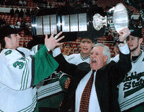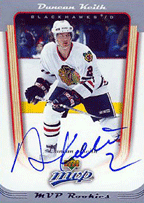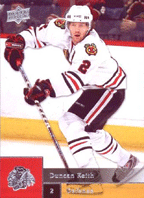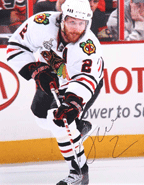| Duncan Keith — Biography | |||||
| bio | facts | what they say | my say | ||
There are two ways to get into the Hockey Hall of Fame. The easy way is to take Toronto Transit to either the Union Street or King Street stop, walk to the corner of Yonge Street and Front Street West, and buy a ticket. Defenseman Duncan Keith prefers the hard way—pay your dues working your way through junior hockey and then the minor leagues, prove your mettle as an NHL rookie, and then lead your team to a Stanley Cup championship through equal parts determination and talent. The Chicago Blackhawks All-Star has done this and more. And from the looks of things, Duncan is just getting started. This is his story…
| |
GROWING UP
Duncan Keith was born on July 16, 1983 in the Canadian city of Winnipeg, Manitoba. (Click here for a complete listing of today's sports birthdays.)He was the second of three children. His parents, Dave and Jean, already had a son, Cameron. A sister named Rebecca arrived in 1984. By then the family had relocated to Fort Francis, Ontario. Dave had accepted a transfer with the Canadian Imperial Bank of Commerce. Jean continued to work in the health field, finding a job at the Rainycrest Home for the Aged.
As a youngster, Duncan became a Bruins fan despite the fact that Fort Frances was some 1,600 miles from Boston. His favorite players were Ray Bourque and Cam Neely. Like any red-blooded Canadian he was also a fan of Wayne Gretzky.
At the age of seven, Duncan began playing hockey with his older brother for the Fort Francis Times Tigers. He began his career as a frontlie player, but after two years he switched to defense. Duncan eventually graduated to the Double-A Atom team at Pinewood Sports and Marine Ltd., and then later the Pee Wee Knights of Columbus.
The Keiths moved two more times by the time Duncan turned 14. First, Dave landed a managerial position at a CIB branch in Sumerland, BC. At the time, Duncan was being recruited for a Triple-A Bantam team in Thunder Bay, Ontario. Then it was a short move to nearby Penticton, where Duncan finished his last two years of minor hockey. The 16-year-old had gained a spot on the Penticton Panthers, a Junior A team in the Interior Conference of the British Columbia Hockey League (BCHL). Perhaps the two most notable BCHL Penticton alumni were Brett Hull and Paul Kariya.
In his three years with the Panthers, Duncan played 163 games and accumulated 226 points (78 goals and 148 assists). While he was on the roster, the Panthers finished first in their division two out of three years. His success in the BCHL got him noticed by college coaches in the U.S., including Michigan State University’s Ron Mason. The winningest coach in college hockey history, Mason recruited Duncan to be a Spartan.
As a freshman, Duncan played in the outdoor game against state rival Michigan—then called the “Cold War” and now known as the “Big Chill.” In that contest, Duncan tied the score at 2-2 on a two-man advantage with 5:43 left in the third period. It was his first collegiate goal. That year’s event set a record for attendance at a hockey game, with 74,554 fans.
Duncan completed his freshman year with 15 points in 41 games (3 goals, 12 assists). The 18-year-old was ranked fourth among collegiate defenseman behind teammates John-Michael Liles, Brad Fast and Andrew Hutchinson. At the end of the season, Liles and Hutchinson were named second team All-Americans.
ON THE RISE
Fifteen games into his sophomore season, Duncan decided to turn pro and joined the Kelowna Rockets, a major junior team of the Western Hockey League. He adjusted to the WHL without a problem. During the 2002-03 campaign with the Rockets, Duncan tallied 46 points (11 goals, 35 assists) in 37 games and had an outstanding +32 plus-minus.
In postseason play, Kelowna swept Vancouver and then Spokane. The Rockets advanced to the WHL Finals by beating Seattle in five games. There they took on Red Deer, taking the league title in six games. Duncan posted 14 points (3 goals, 11 assists) in 19 playoff games. As WHL champions, the Rockets were invited—along with the champions from the Ontario Hockey League andthe Quebec Major Junior Hockey League—to compete in the Memorial Cup. The Rockets lost 2-1 to the Hull Olympiques of the QMJHL in the semifinals.
One stadnout year in junior hockey was all Duncan needed to land on the radar of NHL clubs. In the 2003 draft, the Blackhawks tabbed him in the second round, 54th overall. He was Chicago’s second pick behind Russian teenager Anton Babchuck. Duncan signed a deal as the 2003-04 season began and was assigned to the Norfolk Admirals.
In his rookie year in the AHL, Duncan played 75 games. He lit the lamp seven times and added 18 assists for 25 points. The Admirals finished fifth in their division and qualified for the Calder Cup playoffs. They lost to Philadelphia Phantoms in the Eastern Division semifinals. In the eight playoff games that season, Duncan had a goal, an assist and six penalty minutes.
Duncan was on pace to earn a spot on Chicago ’s roster for the 2004-05 season, until the NHL season was cancelled due to the lockout that year. Duncan continued to play in Norfolk and posted nine goals and 17 assists in 79 games. The Admirals finished third in their division and then were beaten by Philadelphia again in the playoffs.
![]()

Duncan went to training camp with the Blackhawks in the late summer of 2005 and made the team. On October 5, he took the ice for his first NHL game, against the Anaheim Ducks. He scored his first goal on a power play 18 days later in a 4-2 win over the Minnesota Wild. Two nights later, against the Nashville Predators, he assisted on two goals.
Duncan gained confidence and experience in the early going and was ready for more ice time when defensemen Adrian Aucoin and Jassen Cullimore were slowed by groin injuries. On February 8, he logged nearly 30 minutes in the game against the San Jose Sharks.
Duncan finished his rookie year as an important part of Chicago’s defensive corps. At 23 minutes a game, he led the team in ice time. He scored nine goals, added 12 assists and topped the club with 19 blocked shots. The young Blackhawks finished fourth in the Central Division but failed to reach the playoffs. Still the team could not have been happier with Duncan’s development. After the season, Chicago signed him to a four-year contract extension.
Duncan played all 82 games of the 2006-07 season and again led the team in ice time. He upped his scoring to 31 points on two goals and 29 assists and blocked 19 shots, the best mark on the club.
Duncan was paired with Brent Seabrook on the blue line. Their styles and increasing maturity complimented each other perfectly. Duncan became more offensive-minded as the season progressed. In a December game against the Columbus Blue Jackets, he registered three assists against Columbus. In March, he was awarded his first penalty shot. Duncan finished the season with a plus-minus rating of +30. Unfortunately, for the second year in a row, the Blackhawks failed to reach the playoffs.
MAKING HIS MARK
As the 2007-08 season began, the Blackhawks were looking more and more to Duncan as a leader. Chicago had been assembling a talented, young roster. In the draft that summer, the teamhad used the first overall selection on Patrick Kane. TheBlackhawks also signed Jonathan Toews in May of that year.
Duncan held up his end of the bargain. Playing in all 82 games, he topped the club with a plus-minus rating of +14. He was also picked to play in his first NHL-All Star Game. Duncan finished the season with 32 points on 12 goals and 20 assists. Once again, however, Chicago missed the playoffs.
The 2008-09 season opened with the Blackhawks naming Toews as captain, the third youngest player in the NHL with that distinction. For his proven leadership on the ice, Duncan was named as one of the alternates along with Patrick Sharp. Chicago made more headlines off the ice by pickin up Brian Campbell and Christobal Huet as free agents. Campbell’s contract was the largest in team history (eight years at almost $57 million).
With expectations growing, the Blackhawks made a coaching change f our games into the season. Denis Savard with Joel Quenneville, who had formerly guided the Colorado Avalanche and the St. Louis Blues. With coach Q behind the bench, Chicago won six of its next ten games.
The Blackhawks quickly became a closer unit. During a long road trip in December, the team unanimously voted to interrupt its travel schedule and skip a commercial fight home to stay another day in Canada. General Manager Dale Tallon’s father had died, and the players wanted to attend the funeral. Duncan played an important role in that decision.
On the way back after the funeral, the formally attired players surprised the patrons and workers at a McDonalds. After their meal, the Blackhawks arrvied back at their hotel. The players would look back on this day as a crucial bonding experience.
Duncan’s continually improving play also helped the team. He notched 44 points with eight goals and 36 assists, and also showed a tough edge with 60 minutes in penalties. Once again, he led the team in plus-minus with a +33. For the first time since 2002, the Blackhawks reached the playoffs. They won their first two series, but their run ended in the Western Conference Finals against the Detroit Red Wings in five games. Duncan contributed six assists during the postseason.
| |
Duncan and his defensive partner Seabrook had become one of the top defensive pairings in the league. Recognizing this, the Blackhawks made a welcome announcement early in the 2009-10 season. They signed Duncan to a contract extension forworth $72 million for 13 years. At the same time, Toews and Kane also resigned for five more years. Duncan’s contract was the most lucrative in team history, surpassing Marion Hossa’s 12-year, $62 million that had been negotiated just the previous August.
Chicago opened the season in Helsinki, Finland for a pair of games against the Florida Panthers. The Blackhawks shook off their jet-lag on October 12 at the United Center against Calgary. Trailing 5-1 to the Flames, they won 6–5 in overtime. Duncan had an assist on the goal that sent the contest into overtime.
The Blackhawks went on to win five of the next eight and went 8-2-2 in November. They were just as good December, tallying 11 victories for 22 points. By early 2010, Chicago was running away with its division.
The NHL took a break in February, as players around the league suited up for the Olympics. Duncan joined Seabrook and Toews on Team Canada. He played seven games in the tournament and had six assists and a plus/minus rating of +6.
Duncan assisted on Corey Perry’s goal in the gold medal game against the United States to put Canada ahead 2-0. The Americans rallied to tie the score late in the third period. Sidney Crosby netted the overtime game winner, clinching the gold medal for the Canadians in dramatic fashion.
Duncan returned to Chicago ready for the last two months of the season. The Blackhawks cruised to the division title. In 82 games, Duncan posted a career-high 69 points (14 goals, 55 assists) and 51 penalty minutes.
Chicago opened the playoffs against Nashville and dispatched the Predators in six games. The Blackhawks repeated that feat in the next round against the Vancouver Canucks.
Chicago moved on to the Western Conference Finals for the second year in a row. This time the opponent was the San Jose Sharks. Duncan wasn’t going to let anything stand his way—not even losing seven teeth (three on top and four on the bottom), which happened in Game 4 against the Sharks. San Jose’s Patrick Marleau tried to clear the puck from his own end but connected with Duncan’s mouth instead. Immediately, Duncan took a breath, felt that half his mouth was missing, dropped his stick and went straight to the bench. With the help of team doctors, Duncan returned to the ice, missing just six minutes of the game. He finished the second period and assisted on Dave Bolland’s game-tying goal. The Blackhawks went on to win 4-2 and complete a four-game sweep
The Blackhawks were back in the NHL Finals for the first time since 1992, when they were blown out by Mario Lemieux and the Pittsburgh Penguins. This time they faced the Philadelphia Flyers. Chicago took the first two games, but Philly fought back to tie the series.
Chicago hosted the crucial Game 5. With the arena rocking, the Blackhawks scored three goals in the opening period and cruised to a 7–4 victory. During the contest, Duncan high-sticked Daniel Briere, drawing blood near his right eye, but the referees didn’t see it. It was a break for the Blackhawks—the infraction could easily have drawn a major penalty and let Philadelphia back in the game.
Game 6 was a war on Philadelphia’s home ice. The score was knotted 3–3 after regulation. With 4:06 into the first overtime, Kane wristed a shot between Michael Leighton’s pads. He was the only one who saw the puck go in and sold the celebration to the rest of his team. Only moments later did the magnitude of that goal hit the players, the coaching staff and the hockey world—it was the first time in 49 years that the Blackhawks had lifted the Stanley Cup.
Duncan played in all 22 playoff games for Chicago and made a huge contribution with a pair of goals and 15 assists. Two weeks later at the NHL Awards ceremony in Las Vegas, he was awarded the Norris Trophy a’s the leagues top defenseman.
In 2010–11, the Blackhawks learned what so many Stanley Cup winners already knew —defending a title can be even harder than winning it. Part of the problem was that several players left Chicago over the summer for salary cap reasons. The Blackhawks stumbled and bumbled their way through an inconsistent regular season. They squeaked into the playoffs on the season’s last day, edging the Dallas Stars by two points. Duncan fought through hand and finger injuries, and his numbers showed it (7 goals, 38 assists, 22 penalty minutes and a –1 rating).
The Blackhawks faced Vancouver, the top team in the West, in the opening round of the playoffs. Chicago had eliminated the Canucks from the postseason the previous two years. The first three games of the series were all Vancouver. In Game 3, the Blackhawks lost Seabrook on what they considered to be a dirty hit. It seemed to wake the players up.
Suddenly, the championship spirit kicked in and Chicago turned the series around. The Blackhawks blew out Vancouver at the United Center in Game 4. Duncan and Campbell provided the dagger to the heart when they scored 17 seconds apart in a four-goal second period.
The Canucks could not close out the Blackhawks at home in Game 5, as Duncan had one of his greatest games. He scored twice and added a pair of assists to lead Chicago to a rousing 5–0 shutoutn. Back in Chicago for Game 6, the teams tangled in a classic. With the score tied 3–3, Ben Smith banged in a rebound for the Blackhawks in overtime. That put Chicago a game away from becoming only the fourth team in history to recover from a 0–3 series deficit, but it wasn’t to be. The Canucks got a goal from Alexandre Burrows in overtime for a 2-1 victory.
Despite the disappointing end to the 2011 playoffs, Duncan has established himself as one of the NHL’s top blue-liners. His resume includes Stanley Cup champion, Norris Trophy winner and Olympic gold medalist. The quality that best defines him, however, can be expressed in one word: determination.
DUNCAN THE PLAYER
No one will ever confuse Duncan with Bobby Orr or Paul Coffey, but in the NHL of the 21st century he stands as a prototypical two-way defenseman. He is rarely out of position, he excels at blocking shots and his puck-stealing abilities literally can turn games around.
Duncan’s offensive abilities are no less impressive. He is a talented skater with a good arsenal of shots. He reads the ice exceptionally well and is a superb passer. With the explosive talent Chicago has on its front line, it is not inconceivable that Duncan might consistently produce 80-point seasons.
For Duncan, however, hockey is about winning. His numbers are a byproduct of that effort. Having sipped from the Stanley Cup once, his aim at the beginning of each season is to make the playoffs.
| Duncan Keith — Biography | |||||
| bio | facts | what they say | my say | ||
© Copyright 2011 Black Book Partners, LLC. All rights reserved.




